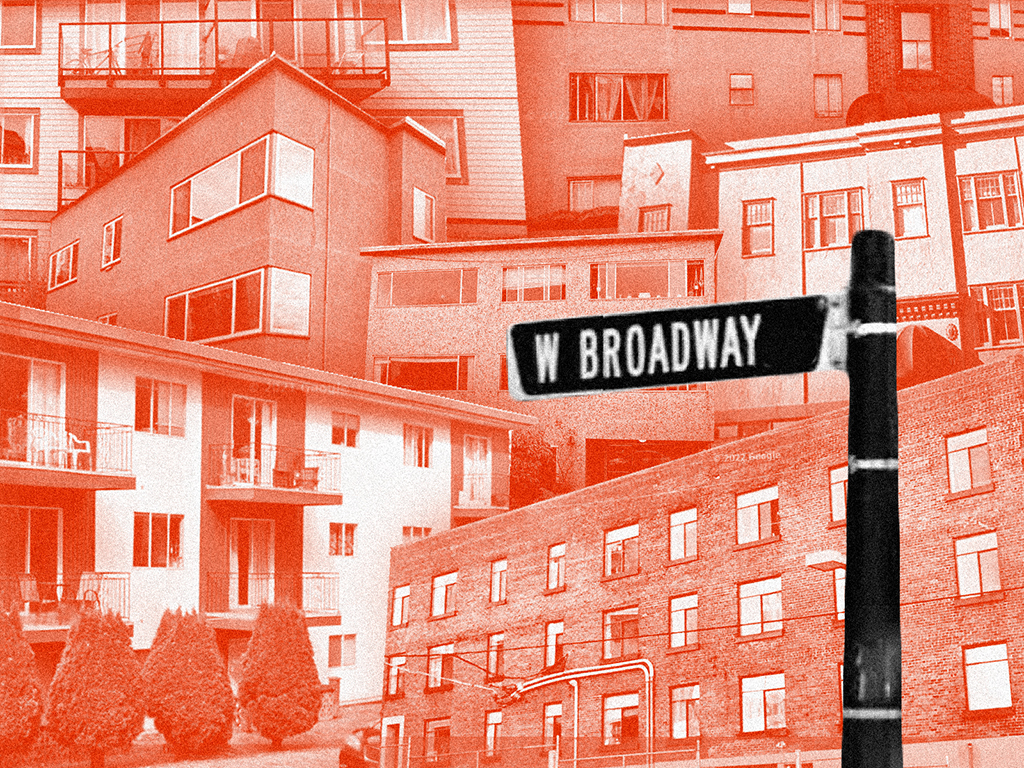Vancouver council will make a decision Wednesday that could mean eviction or protection for thousands of tenants living in the six-kilometre Broadway Corridor from Vine to Clark and First to 16th avenues.
That's when council will decide on a “pace of change” report city staff plans to present. The Broadway Plan covers an area that includes about 50,000 households, 25 per cent of the city's renters and hundreds of older apartment buildings with moderate rents.
The previous council asked for this pace of change report when it passed the Broadway Plan, which was crafted to increase density and create more rental apartments and jobs along the new Broadway SkyTrain line.
But if developers are allowed to build new highrises in this area, already dense with apartment buildings with quite moderate rents, what will happen to the current tenants?
City staff have crafted a plan with four options for how many development applications can proceed in the current apartment areas of the Broadway Corridor. The apartment areas make up slightly less than half of the entire corridor, leaving the rest of the area, which doesn't have a lot of apartment buildings and tenants who would have to be evicted, to have faster development.
Already the Broadway Plan area is the scene of a huge number of redevelopment enquiries, according to city staff. Between Sept. 1 and Dec. 7, 2022, the city received 91 enquiries, compared to an average 78 enquiries per year for the whole city, not just the Broadway Corridor.
Staff have proposed four options with a clever way of rating which development permits could go ahead each year. One option is to approve five buildings per year, the second would allow 15 buildings and the third would allow 30. A fourth option would be to set no annual limits.
Staff estimate that the four options would involve 180 to 2,000 tenant households per year, depending on what council decides.
And they propose approving applications based on a formula that provides the most affordability in the long run. For each proposal they would calculate a ratio of new below-market rentals created to current below-market rentals that would have to be demolished. Proposals that score highest could be advanced.
But I am worried.
When I searched the policy platform of the current ABC council I didn't see the word renter or tenants once. And this ABC council did abolish the city's renters office. So I am fearful that current tenants could be sacrificed to the drive for more and more expensive rentals. Council doesn't have to approve any of the three options and could just let the developments rip.
There are three issues as I see it if council goes for anything other than option one, allowing five new buildings per year.
Will the city have enough staff to enforce the current Tenant Relocation and Protection Policy that is 23 pages long and requires a lot of staff discretion and probably intervention between developers and tenants? With no renter office, are there enough people in the planning department to do this properly? With option three, staff would have to work with an estimated 910 tenant households per year. Are there enough staff to do this? If all the options are discarded, would it be impossible to enforce the tenant protections at all?
Second, when the Broadway Plan was passed the old council stipulated that demovicted tenants living there would be eligible to return to the new building at 20 per cent below market rent or their old rent, whichever is less, and that they would be eligible for a rent top-up from the developer while they waited for the new building to be finished, which can take years. Will the developer top-up of interim rents be enough to allow evicted tenants to stay in their current neighbourhood?
Staff say that the amount of bridge funding will be based on the Canada Mortgage and Housing Corp. average rent for newer buildings in Vancouver: $1,884 for a bachelor, $2,122 for a one-bedroom, $2,888 for a two-bedroom and $3,702 for a three-bedroom. But there is a huge difference between average rents and rents for vacant apartments, which is what demovicted renters will need to access.
Averages for vacant apartments in Vancouver range from $2,291 for a bachelor to $5,539 for a three-bedroom according to the CMHC. If the bridge funding isn't high enough for evicted tenants to actually afford a place in Vancouver, demovicted tenants could have to leave the city and set up entirely new lives before their chance at getting a new unit at their old rent comes up.
If council decides to ignore the three pace of change options in favour of letting development go at as quickly a pace as possible, will there be enough vacant apartments in the city for demovicted tenants to go to? Or, with those 91 development enquiries in three months (and probably more since then), will thousands of tenants in moderately priced apartment buildings be demovicted with no place to go? ![]()
Read more: Housing, Municipal Politics, Urban Planning
















Tyee Commenting Guidelines
Comments that violate guidelines risk being deleted, and violations may result in a temporary or permanent user ban. Maintain the spirit of good conversation to stay in the discussion.
*Please note The Tyee is not a forum for spreading misinformation about COVID-19, denying its existence or minimizing its risk to public health.
Do:
Do not: